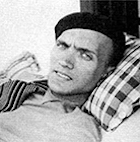| |

|
|
max blecher
Max Blecher was born in Botoşani, Romania, on September 8, 1909, into a middle-class Jewish family. His father owned a porcelain shop.
He spent his childhood and adolescence in Roman, where there was a sizable Jewish community, and was an active member of the Maccabi Zionist
association during his high-school years. Upon graduating, he left for Paris to study medicine, but soon became ill and was diagnosed
with spinal tuberculosis. He was 19. After being treated for six years in various sanatoria, such as at Berck-sur-Mer (France), Leysin (Switzerland),
Braşov and the Black Sea town of Tekirghiol (Romania), he ultimately returned to Roman where, confined to bed, he began to translate
(Guillaume Apollinaire inter alios) and to write, contributing to Le surréalisme au service de la révolution
and other journals as well as corresponding with some of the leading artists and intellectuals of the day, such as André Breton, André Gide, Martin Heidegger,
Ilarie Voronca, Léon-Paul Fargue, and Mihail Sebastian. His first collection of poetry, Transparent Body was published in 1934, followed by the "novels"
Adventures in Immediate Irreality (1936) and Scarred Hearts (1937). His final work of prose, The Illuminated Burrow,
was written in 1937-38 but only published posthumously, first in an abridged edition in 1947 and then in full in 1971. Often described as
"hallucinatory" and "nightmarish," Blecher's writing is a kindred spirit to Surrealism and a major contribution to the 20th-century European
avant-garde. He died of his disease on May 31, 1938.
|
|
 |
|

translations published by TSP:
The Illuminated Burrow
Transparent Body & Other Texts
also by the author:
Adventures in Immediate Irreality
Scarred Hearts
|